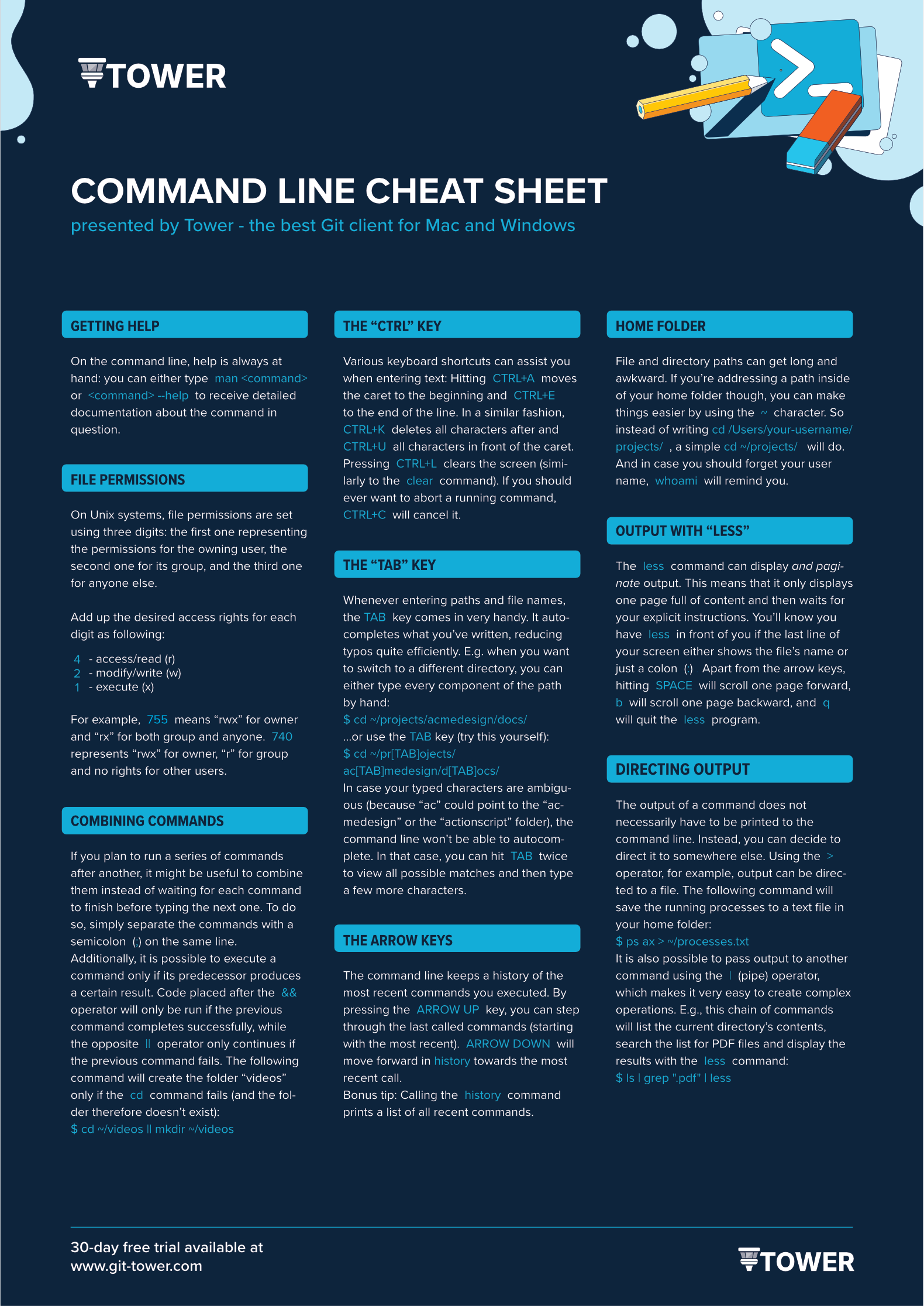Vagrant-cheat-sheet.md Typing vagrant from the command line will display a list of all available commands. Be sure that you are in the same directory as the Vagrantfile when running these commands!
The following are a list of commonly used commands for encrypting documents in Terminal (Mac, Linux) or PowerShell (Windows).
Windows 10 Cmd Commands Cheat Sheet Pdf

- The notation d:, for example, indicates an optional drive designation. The command syntax, on the other hand, is how you enter the command to make it work. To open the DOS command window in Windows simple press the “Windows Logo + r”, type cmd and then press Enter.
- Apr 10, 2021 - Docker command cheat sheet in Image format, Docker compose command cheat sheet and Docker commands cheat sheet pdf.
- Wireshark Cheat Sheet – Commands, Captures, Filters & Shortcuts Wireshark is an essential tool for network administrators, but very few of them get to unleash its full potential. Having all the commands and useful features in the one place is bound to boost productivity.
- Format a Pointer. C Read as integer, print as character. D Integer, signed decimal. F Floating point number. O Integer, print as octal. S Try to treat as C string.


| Creating A New Keypair | |
| gpg --gen-key | Prompts for information and then creates an appropriate keypair |
| Importing, Exporting, and Refreshing Keys | |
| Importing | |
| gpg --import File | Imports a key contained in File to the appropriate keyring |
| gpg –recv-keys KeyID1 KeyID2 | Receives the key which corresponds to KeyID1, KeyID2, etc from the provided keyserver |
| gpg --search-keys Term1 Term2 | Searches for keys which contain Term1 and Term2, etc and provides an interactive interface to choose the correct key to import to the appropriate keyring |
| Exporting | |
| gpg --export -a KEYID > publickey.asc | Output a public key to a plain text file |
| gpg --send-keys KeyID | Upload a public key to a keyserver |
| Refreshing | |
| gpg --refresh-keys | Check to see if your version of a key is out of date. If so update it. |
| Printing Key Information | |
| gpg --list-keys | Print a list of all of the keys in your public keyring |
| gpg --list-keys UniqueID | Print all keys matching UniqueID |
| gpg --list-sigs | Print a list of all keys in your public keyring and their associated signatures |
| gpg --list-sigs UniqueID | Print a list of all keys and their associated signatures matching UniqueID |
| gpg --fingerprint | Print a list of all keys in your public keyring and their associated fingerprints |
| gpg --fingerprint UniqueID | Print a list of all keys and their associated signatures matching UniqueID |
| Signing a Key | |
| gpg --fingerprint UniqueID | Check the local key fingerprint against the reported fingerprint |
| gpg --sign-key UniqueID | If the fingerprints match sign the key with your private key |
| Encrypting and Signing | |
| Encrypting | |
| gpg -er Recipient File | Produces File.gpg an encrypted version of File, which can be decrypted by Recipient |
| echo “Text” | gpg -ear Recipient | Produces an encrypted version of Text which can be decrypted by Recipient and prints the result to the terminal |
| echo “Text” | gpg -ear Recipient > OutFile | Produces an encrypted version of Text which can be decrypted by Recipient and writes the result to OutFile |
| cat InFile | gpg -ear Recipient | Produces an encrypted version of the text contained in InFile which can be decrypted by Recipient and prints the result to the terminal |
| cat InFile | gpg -ear Recipient > OutFile | Produces an encrypted version of the text contained in InFile which can be decrypted by Recipient and writes the result to OutFile |
| Signing | |
| gpg -s File | Produces File.gpg, a signed version of File, which can be verified |
| echo “Text” | gpg -as | Produces a signed version of Text and prints the result to the terminal |
| echo “Text” | gpg -s > OutFile | Produces a signed version of Text and writes the result to OutFile |
| cat InFile | gpg -as | Produces a signed version of the text in InFile and prints the result to the terminal |
| cat InFile | gpg -s > OutFile | Produces a signed version of the text in InFile and writes the result to OutFile |
| gpg --detach-sign File | Produces a separate signature, File.sig, which can be used to verify File |
| echo “Text” | gpg --clearsign | |
| cat InFile | gpg --clearsign | |
| Encrypting and Signing | |
| gpg -esr Recipient File | Produces File.gpg, an encrypted and signed version of File, which can be decrypted and verified by Recipient |
| echo “Text” | gpg -esar Recipient File | Produces an encrypted and signed version of Text which can be decrypted and verified by Recipient and prints the result to the terminal |
| echo “Text” | gpg -esar Recipient File > OutFile | Produces an encrypted and signed version of Text which can be decrypted and verified by Recipient and writes the result to OutFile |
| cat InFile | gpg -esar Recipient | Produces an encrypted and signed version of the text in InFile which can be decrypted and verified by Recipient and prints the result to the terminal |
| cat InFile | gpg -esar Recipient > OutFile | Produces an encrypted and signed version of the text in InFile which can be decrypted and verified by Recipient and prints the result to the terminal |
| Decrypting and Verifying | |
| gpg -d InFile > OutFile | Decrypt and/or verify File |
| echo “Cipher Text” | gpg -d | Decrypt and/or verify Cipher Text |
| echo “Cipher Text” | gpg -d > OutFile | Decrypt and/or verify Cipher Text and write the result to OutFile |
| cat InFile | gpg -d | Decrypt and/or verify the contents of File |
| cat InFile | gpg -d > OutFile | Decrypt and/or verify the contents of File and write the result to OutFile |
| Symmetric Encryption | |
| gpg -c File | Create a file symmetrically encrypted with a passphrase |
| gpg -ca File | Create a file symmetrically encrypted with a passphrase readable as plain text |
| echo “Text” | gpg -ca | Symmetrically encrypt Test with a passphrase and output the result to the terminal |
| echo “Text” | gpg -c > OutFile | Symmetrically encrypt Test with a passphrase and write the result to OutFile |
| cat InFile | gpg -ca | Symmetrically encrypt the text in InFile and output the result to the terminal |
| cat InFile | gpg -c > OutFile | Symmetrically encrypt the text in InFile and write the result to OutFile |


Cmd Linux Commands Cheat Sheet
Created by Brian Balsamo. Used with permission.
